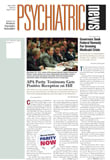In an attempt to bridge the gap between untreated mental illness in older Americans and the services that can dramatically improve their quality of life, Rep. Patrick Kennedy (D-R.I.) introduced the Positive Aging Act of 2002.
During a July 1 visit to the Cumberland Senior Center in Cumberland, R.I., Kennedy, a longtime Congressional champion of better mental health care, announced the new legislation. It is designed to promote geriatric mental health outreach services and integrate mental health screening and services into primary care settings.
“Disability due to mental illness in our elderly population is rapidly becoming a major public health dilemma,” Kennedy said at the senior center. “This legislation will enable seniors to receive mental health services in the health care facilities they are most familiar with.”
Kennedy introduced the Positive Aging Act of 2002 (HR 5077) in the House of Representatives. The bill was then referred to the House Committee on Energy and Commerce, which has not yet taken action on it.
The legislation would provide mental health screenings, referrals for follow-up care and consultations, and the use of evidence-based medicine for the treatment of mental health disorders in primary care settings.
The legislation also includes a component for the education of primary care clinicians on mental health issues.
In addition, the act would provide funding for mental health outreach teams to travel to the primary care facilities and nursing homes to provide treatment. According to the bill, despite the fact that “on average, a quarter of all patients seen in primary care settings have a mental illness, primary care practitioners identify such illness in only about half of these cases.”
The bill does not specify how much money should be appropriated to provide the services specified but instead asks that funding be provided “as necessary.”
Kennedy sought and received expertise about how to keep seniors with mental illness from ending up in hospitals and other institutions. In doing so, he collaborated with the American Association for Geriatric Psychiatry and, in particular, Gary Kennedy, M.D., who is president of that organization. The two men are not related.
“It is very rare when science drives policy, but here it is the impetus behind the legislation,” Gary Kennedy told Psychiatric News. For instance, mounting evidence shows that integrating mental health services with general medical services produces improved mental health outcomes, he noted.
“The idea behind this legislation is to have psychiatrists and mental health professionals work with the seniors where they are most likely to be found—in the primary care setting, senior citizen centers, and retirement communities,” he said.
Rep. Kennedy’s legislation would authorize the Substance Abuse and Mental Health Services Administration (SAMHSA) and its parent agency, the Department of Health and Human Services, to carry out certain aspects of the legislation. Specifically, the legislation would do the following:
• Authorize SAMHSA to integrate screening and mental health treatment services at primary care sites that serve geriatric populations.
• Authorize a new SAMHSA grant program to support geriatric mental health outreach teams in settings where seniors live or receive social services.
• Foster collaborations between mental health professionals and senior centers, adult day-care programs, and assisted-living facilities.
• Establish a new deputy director for geriatric mental health services within the Center for Mental Health Services (CMHS) to develop and implement initiatives that address the mental health needs of older Americans.
• Create positions on the advisory council of CMHS for older Americans, their families, and geriatric health specialists.
The Positive Aging Act of 2002 is an outgrowth of the Positive Aging Project, which Kennedy established in February to help seniors living in Rhode Island. Kennedy obtained a $935,000 federal appropriation to enable Landmark Medical Center in Woonsocket, R.I., to launch the program.
The project, which is housed in the Community Resource Center at Landmark’s Senior Health Center, provides education, screening, and treatment for disorders that occur often in older adults and the emotional distress that often accompanies these diagnoses.
The text of the Positive Aging Act of 2002 can be accessed on the Web at http://thomas.loc.gov by searching on the bill number, HR 5077. ▪
